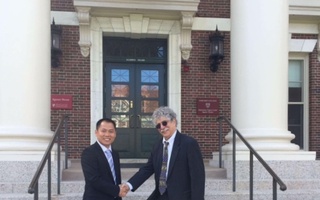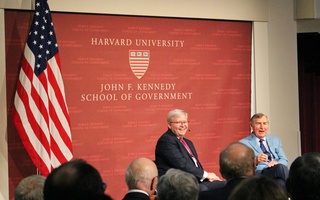"So far the attitude of the Bush Administration has been pretty disappointing," says Ye Yang, a graduate student in comparative literature. "It might be a game on his part. Let the Congress and the Senate play the militant role."
Ye, a member of the independent Chinese Students Association that was formed at Harvard in response to the pro-democracy movement, has been working to get the United States to adopt economic sanctions against the Chinese government.
Although he maintains that sanctions have the support of most of the Chinese students in the Boston area, Ye acknowledges that such measures are highly controversial. But he avidly maintains that the U.S. has no other effective means at its disposal.
"Economic sanctions are the thing that they are afraid of most," says Ye. "And the country that they care about most is still the United States."
The U.S. is currently China's third largest trading partner--after Hong Kong and Japan--and American investments there total $3.5 billion.
At a forum on Wednesday sponsored by the Kennedy School of Government's Institute of Politics, Ye listed one by one the arguments used against sanctions and countered them with his own arguments. One popular view is that sanctions would inevitably push China toward the USSR, Ye said.
"This argument is particularly pushed by Richard Nixon," he says. "Who else?."
In fact, Ye points out, China split from the the Soviet Union's camp in the 1950s, and there is little reason to think that an adversarial relationship with the U.S. would make it go back.
Another Nixonesque argument is that economic sanctions would force China to cut itself off from the rest of the world, Yang says, countering that in the modern era, China already has too many ties to other nations to be able to isolate itself.
Frequently heard among Chinese students is the argument that sanctions would only hurt the Chinese people.
"The problem is whether you want them to suffer longer or to suffer shorter," says Ye. There is no getting around the fact that people would be hurt by sanctions, he says. But in the long-term, people will suffer more in a repressive government, he adds.
Another major endeavor of Chinese students relates to the visa problems that many of them face. The overwhelming majority of the 40,000 Chinese students studying in the U.S. are here on so-called "J" visas, which require them to return home on completion of their degrees.
Once they return to China, holders of J visas are ineligible to come back to the U.S. for another two years. And many of them are subject to arrest or worse for their actions in support of the prodemocracy movement here.
Zhao points to the example of Liu Xiaobo, a former graduate student at Harvard who returned to China last month to take part in the demonstrations at Tienanmen Square. Liu was reportedly hustled into a car by a man in plainclothes on June 6, three days after the crackdown began.
An article in the People's Daily described Liu as a "black hand" and criticized him as a "Westerntrained" intellectual, Zhao said.
Read more in News
The Thesis That Almost Wasn'tRecommended Articles
-
Chinese Students Happy With Executive OrderChinese students at Harvard said they were pleased with President Bush's recent executive order, which will allow them to remain
-
LAST LECTURE ON CHINARev. A. H. Smith of Tientsin, China, will deliver the last of a course of six lectures on "The Present
-
Color Line Cuts Through the HeartJimmy Zhao ’08 says his parents used to joke that if he ever brought a white girl home, at least
-
 Donor Funds Ed School Research on Chinese Academic Stress
Donor Funds Ed School Research on Chinese Academic Stress -
 Former Asst. Defense Secretary Advises Path for U.S.-Chinese Relations
Former Asst. Defense Secretary Advises Path for U.S.-Chinese Relations













